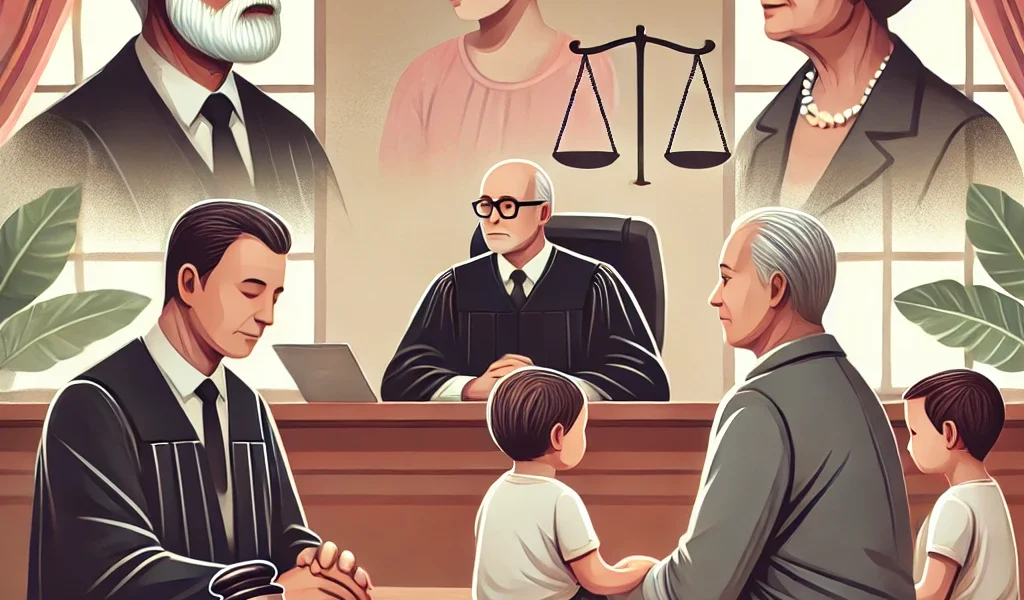Introduction
Grandparents play a vital role in a child’s life, offering love, stability, and emotional support. However, when family conflicts arise—whether due to divorce, separation, or the unfortunate loss of a parent—grandparents may find themselves struggling to maintain a relationship with their grandchildren.
Family law recognizes the importance of grandparents in a child’s life, but their legal rights regarding custody and visitation vary based on jurisdiction and specific circumstances. This guide will explain grandparents’ rights, the legal process, eligibility requirements, and how to navigate family court effectively.
Disclaimer: This article is for informational purposes only and does not constitute legal advice. Laws differ by state and country, so consulting a qualified family law attorney is essential before taking legal action.
Understanding Grandparents’ Rights
In most legal systems, parents have the primary right to make decisions about their children, including who they interact with. However, in certain situations, grandparents can petition the court for visitation rights or even custody if it is in the child’s best interests.
There are two main types of legal rights that grandparents may seek:
- Visitation Rights – The legal right to spend time with a grandchild, even if the parents object.
- Custody Rights – The right to assume legal guardianship of the child, often granted when the parents are unfit or unable to provide proper care.
Visitation Rights for Grandparents
When Can Grandparents Seek Visitation?
Grandparents can request court-ordered visitation if they are being denied access to their grandchildren. The court evaluates factors such as:
- The existing relationship between the grandparent and the grandchild.
- Whether the child will suffer emotional harm if visitation is denied.
- The parents’ reasons for restricting access.
- The overall well-being and best interests of the child.
Common Situations Where Courts Grant Visitation
- Divorce or Separation: If the parents have separated or divorced, the grandparent may request visitation to maintain a relationship with the child.
- Death of a Parent: If one of the parents has passed away, the court may grant visitation rights to the deceased parent’s parents.
- Parental Unfitness or Absence: If a parent is unfit (due to substance abuse, incarceration, neglect, etc.), the court may allow the grandparent to maintain a stable presence in the child’s life.
- Family Disputes: If a parent is unfairly preventing a grandparent from seeing the child, the court may intervene to enforce visitation rights.
How to File for Visitation Rights
If a grandparent is denied access to their grandchild, they can take the following legal steps:
- Consult a Family Law Attorney: An experienced lawyer can guide you through state-specific legal requirements.
- Gather Evidence: Proof of a close relationship with the grandchild, such as photos, messages, or witness testimonies.
- File a Petition: Submit a formal request for visitation to the family court.
- Attend Mediation (If Required): Some courts require mediation before proceeding to a formal hearing.
- Court Hearing: A judge will assess whether visitation is in the child’s best interests.
- Receive a Court Order: If approved, the court will issue a visitation schedule that must be followed.
Custody Rights for Grandparents
When Can Grandparents Seek Custody?
Courts prioritize placing children with their biological parents unless it is proven that parental custody is not in the child’s best interest. Grandparents may seek custody under the following conditions:
- Parental Neglect or Abuse – If the child is in an unsafe environment due to abuse, neglect, or domestic violence.
- Substance Abuse or Addiction – If the parents are addicted to drugs or alcohol and cannot care for the child.
- Incarceration of Parents – If both parents are in prison, a grandparent may assume custody.
- Parental Death – If both parents are deceased, grandparents may seek guardianship or adoption.
- Abandonment – If the child has been left without proper care and supervision.
Types of Custody Grandparents Can Seek
- Legal Custody – The right to make important decisions about the child’s education, healthcare, and overall well-being.
- Physical Custody – The child resides with the grandparent full-time.
- Temporary Custody – A short-term arrangement while parents recover from hardship.
- Permanent Custody – Granted when parents are deemed permanently unfit.
How to File for Custody as a Grandparent
- Hire an Attorney: Since custody cases can be complex, legal representation is crucial.
- File a Petition: Submit a formal request to the family court for custody.
- Provide Evidence: Gather documents proving that parental custody is unsafe or unfit.
- Child Welfare Evaluation: In some cases, a child welfare agency may investigate the home environment.
- Court Hearing: A judge will determine whether the grandparent’s custody request is in the child’s best interest.
- Receive a Court Order: If approved, the grandparent will receive legal custody rights.
Challenges Grandparents Face in Custody & Visitation Cases
While family courts acknowledge the importance of grandparents, they prioritize parental rights. Some challenges grandparents may face include:
- Parental Objections: Courts hesitate to override a parent’s decision unless there is clear evidence of harm to the child.
- Legal Hurdles: Some states have strict rules limiting grandparents’ rights.
- Emotional Strain: Court battles can be stressful for both the grandparents and the child.
- Financial Burden: Legal fees, court costs, and child-rearing expenses can be significant.
How to Strengthen Your Case
- Show a consistent and positive relationship with the child.
- Provide documented evidence of neglect, abuse, or unsafe parental conditions.
- Seek mediation to resolve conflicts before resorting to legal action.
- Work with an experienced family lawyer familiar with local custody laws.
Conclusion
Grandparents play an essential role in a child’s development, and while they do not have automatic legal rights, they can seek visitation or custody under specific circumstances. Courts will always prioritize the child’s best interests, meaning evidence of a strong, stable relationship with the grandchild is crucial.
If you are a grandparent seeking legal custody or visitation, it’s advisable to consult a family law attorney who can guide you through the complex legal process. By understanding your rights and following proper legal procedures, you can maintain a meaningful relationship with your grandchildren while ensuring their well-being.




